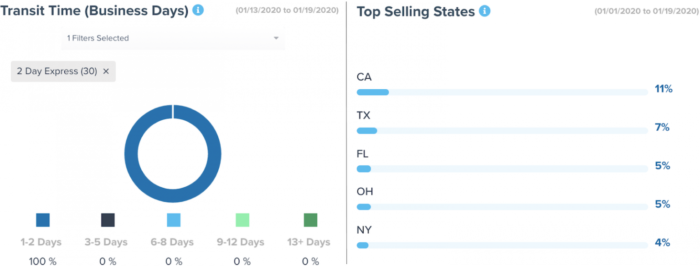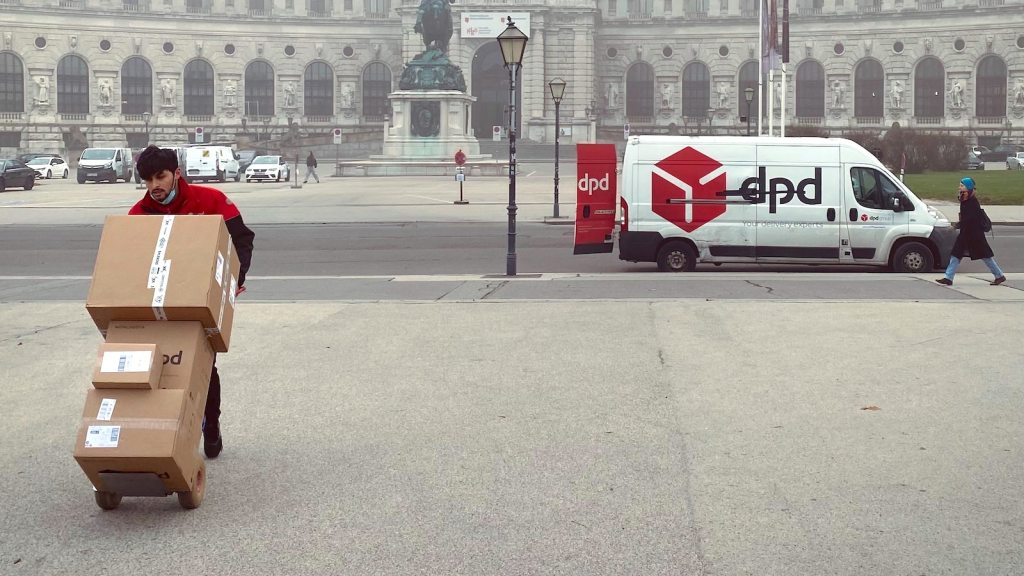Table of Contents
** Minutes
What are regional parcel carriers?
How do regional shipping carriers work?
Top 4 regional parcel carriers
4 benefits of using regional parcel carriers
When does it make sense to use a regional parcel carrier?
When does it NOT make sense to use a regional parcel carrier?
Flexibility, affordability, and responsiveness.
That’s what ecommerce businesses look for in a shipping carrier partner to help meet customer expectations. But with major shipping carriers like UPS and FedEx servicing hundreds of millions of accounts and consumers in the United States alone, how does a business owner get the service they desire from a carrier partner?
Since ecommerce continues to grow rapidly — and major carriers face capacity challenges — online brands are turning to regional parcel carriers to help fill gaps in their shipping strategy.
Regional parcel carriers offer several advantages for direct-to-consumer (DTC) brands, but the decision to partner with a smaller, local-based carrier depends on several factors, such as company size, where your customers are located, what type of products you sell, your volume, and whether or not you partner with a 3PL.
In this article, you will learn:
- How regional parcel carriers work
- The benefits of partnering with regional parcel carriers
- When it makes sense to add regional parcel carriers to your network
What are regional parcel carriers?
Compared to global carriers, regional parcel carriers are smaller, local carriers that provide fast, affordable shipping and transportation services for businesses, including ecommerce brands. There are two major types: regional carriers that cover specific cities and/or surrounding regions, and those that have multi-state coverage within the same region.
How do regional shipping carriers work?
Regional shipping carriers cover more than 85% of the US population and specialize in short-haul deliveries (usually up to 500 miles but often much less). These regional carriers partner with businesses independently, as well as with 3PL companies like ShipBob, and deliver orders to zip codes within their network.
The goal of regional carriers is to serve a smaller geographical network to offer delivery services that are more responsive, cheaper, and faster. Sometimes, they can offset congestion with major carriers — especially during peak season.
Top 4 regional parcel carriers
There are multiple regional parcel carriers in the US that coverage different cities, states, and regions. Choosing a regional carrier depends on where you are fulfilling orders, where your customers live, what type of products you sell, and what additional delivery services (if any) you need to meet customer expectations.
Here are just a few of the leading regional parcel carriers that cover major areas of the US, from the East Coast to the West Coast. ShipBob works with CDL Last Mile Solutions and On Trac to reduce transit times, make shipping more affordable, and optimize deliveries.
| Regional carrier | Locations | Shipping services |
| CDL Last Mile Solutions | East Coast (NY, NJ, CT, PA, DE, DC, MD and VA) | Same-day, next-day, and overnight delivery, plus white glove services |
| United Delivery Service (UDS) | Midwest (IL, IN, WI) | Same-day and next-day delivery |
| Lone Star Overnight (LSO) | Texas | Multiple same day and next day options, plus Saturday delivery |
| On Trac | West Coast (AZ, CA, CO, ID, NV, OR, UT, WA) | Mid-day service, same-day ground shipping, and DirectPost® , plus “Collect on Delivery” services |
4 benefits of using regional parcel carriers
Regional parcel carries can offer more flexibility, cost-savings, and support than major national and international shipping carriers. Here are the four biggest benefits of partnering with regional parcel carriers to optimize your supply chain.
1. Lower costs
If you have a large volume of customers within a specific region, partnering with a regional carrier can help reduce shipping costs for a bulk of your customers. Regional parcel carriers are able to offer lower shipping rates since they have lower operating costs and focus on regional contracts.
In fact, regional carriers can save ecommerce brands up to 10% – 40% in shipping costs compared to working with only major carriers like UPS and FedEx.
For weekends and peak season deliveries, major carriers often add surcharges, but some regional carriers may not add similar surcharges for local deliveries, which allows you to better control shipping costs.
2. Faster delivery times
Most regional carriers specialize in next-day or same-day delivery, as long as orders are being delivered within their regional network.
Many regional carriers also offer different freight shipping options, such as full truckload, less-than-truckload, and partial truckload to further optimize shipping costs and speed up transit times.
Choosing a regional carrier also helps to beat congestion with major carriers, especially during the busy holiday shopping season. During seasons with higher order volumes, adding a regional carrier to your shipping network can help optimize your shipping strategy.
3. Customized shipping options
When you work with a regional carrier, you’re able to customize your shipping options for more flexibility.
For instance, many regional carriers tend to offer additional, value-added services such as white glove for delivering luxury, high-value items or heavy items such as furniture to both residential or commercial destinations.
Some regional carriers, such as On Trac (servicing the West Coast), offer “Collect on Delivery” services in which orders are delivered and payment is collected on behalf of the shipper.
4. Customer-centric shipping solution
Since regional carriers tend to hold a high standard across all deliveries, merchants often see a greater degree of customer service and responsiveness. For instance, some local carriers offer multiple pickup times on the same day, which provides more flexibility on when orders need to be fulfilled and shipped in order to still be delivered on time.
When does it make sense to use a regional parcel carrier?
It makes sense to use a regional parcel carrier if you are looking to cut costs in shipping and provide faster delivery for customers.
If you ship to a niche area and want faster shipping options, then partnering with a regional parcel carrier makes the most sense. This way, you can avoid congestion with major carrier, lower shipping costs, and speed up last-mile delivery.
Of course, some areas in the US don’t have regional carrier coverage. Be sure to analyze historical order data to determine where a bulk of customers are located before choosing a regional parcel carrier to partner with.
When does it NOT make sense to use a regional parcel carrier?
To optimize shipping costs and expand coverage, many online brands leverage a combination of regional and national carrier partners.
However, if you’re in charge of logistics operations, adding additional shipping partners can add more complexity than cost-savings. A couple other considerations worth calling out:
- If you ship orders through both major and regional carriers, then you might not be able to reach the volume threshold to qualify for bulk shipping discounts.
- You may need to put some technology changes in place to accommodate including the ability to set up and route orders to the proper carrier, along with generating their labels.
That’s why many online brands partner with a 3PL that have existing relationships with all types of shipping carriers, from regional to international, and negotiate shipping rates and pass the savings on to you.
With a 3PL, you can optimize your shipping strategy without needing to manage multiple carriers on your own and still offer more shipping options for your customers while also taking advantage of discounted shipping rates.
Tech-enabled 3PLs that work with regional partner carriers often automate and optimize your shipments to ensure they get delivered via the fastest, most cost-effective manner.
How regional parcel carriers work with 3PLs
If you outsource fulfillment to a 3PL that works with regional parcel carriers, you can provide faster, more affordable shipping options for customers based on where they live and what fulfillment center locations you ship orders from.
For instance, ShipBob has multiple fulfillment centers across the US, including several locations in the Northeast. One of our many regional carrier partners, CDL Last Mile Solutions, specifically covers this region and picks up packages from all our Northeastern-based fulfillment centers.
This provides merchants the ability to:
- Reduce transit times.
- Offer fast, affordable 2-day coverage.
- Offset congestion faced by larger carriers.
ShipBob partners with multiple regional carriers that cover different regions of the US, and each regional carrier offers more than 20 years of experience and specialize in both B2C and B2B parcel deliveries.
Since ShipBob’s entire fulfillment network is powered by our proprietary 3PL software, ShipBob will send an order to the fulfillment location closest to your customer to offer the fastest and most cost-effective shipping option. ShipBob automatically chooses the carrier that can provide this, so you don’t have to customize or optimize your account yourself.
You’re also given access to advanced data and analytics reporting in your ShipBob dashboard that provides shipping insights and data to determine how to optimize shipping speeds and costs.

By partnering with a 3PL like ShipBob, you can worry less about how to optimize shipping and spend less time managing carrier partnerships. This way, you can focus your attention on growing your business.
Partner with ShipBob
ShipBob is a third-party logistics (3PL) company that offers a robust fulfillment infrastructure, 2-day shipping, and best-in-class technology to provide online brands with flexible fulfillment and shipping solutions.
“ShipBob has been a great ally as they have fulfillment centers all over the US, facilitating a 2-3 day delivery time for any customer in the US.”
Andrea Lisbona, Founder & CEO of Touchland
With ShipBob, you can expand your customer reach, stay competitive, and save on time and logistics costs.
If you’re ready to outsource fulfillment to ShipBob, click the button to get started with custom pricing.
Regional parcel carriers FAQs
Here are answers to common questions that online brands have related to regional parcel carries.
How do regional parcel carriers work?
Regional parcel carriers work similarly to major shipping carriers but only cover a specific city, state, or region. This allows packages to be delivered faster at an affordable cost. They transport shipments, often by picking up from a warehouse, and deliver them to end consumers. Some regional parcel carries also partner with 3PLs that have thousands of customers and fulfillment centers within the regional carrier’s network.
Should you use regional carriers for ecommerce?
It all depends, but regional carriers do offer lower shipping costs and faster delivery for online brands. Merchants that have a high volume or concentration of customers in a specific area can take advantage of partnering with a regional carrier to save on cost and speed up delivery.
However, keep in mind that working with regional carriers can push you below the volume discount threshold with major carriers. Also, managing multiple carrier partners can add complexity to logistics operations, and there can be some tech limitations, from order routing to label generation.
How do regional parcel carriers work with 3PLs?
Regional carriers work similarly with 3PLs as major carriers do. Regional parcel carriers are added to the 3PL’s carrier network, pass negotiated discounted rates on to their merchants, pick up from 3PL’s fulfillment centers, and integrate their technology to enable orders that need to go through a certain carrier.
That way, you can still take advantage of major carriers like UPS, USPS, FedEx, and DHL as well other regional carriers like CDL Last Mile Solutions and United Delivery Services, all without having to manage carrier routing yourself.
The carrier used to ship an order is based on where inventory is located and the order’s destination. A tech-enabled 3PL like ShipBob will ensure the best shipping option is chosen based on standard shipping.






